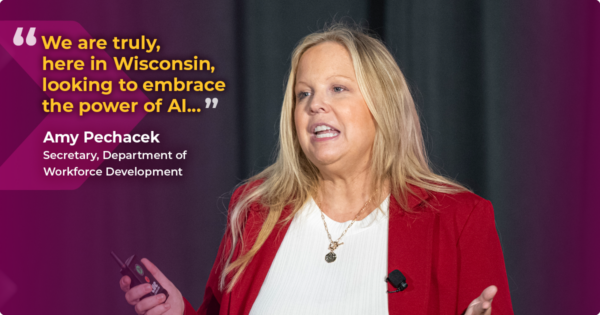
“Thriving with AI: How Wisconsin Businesses Are Leading the Future,” a panel at the Wisconsin Economic Summit 2024, featured (from L to R) Craig Andersen, Jane Stull, Kyle Crum, Ajay Sahajpal, and moderator Matt Kirchner.
Wisconsin is well-positioned to capture the benefits of the revolution in artificial intelligence (AI), and for companies not using the technology, experts offer this advice: Get going.
“We need in Wisconsin to adopt a ‘just start’ attitude toward artificial intelligence,” said Matt Kirchner, president of ATS/LAB Midwest and host of the TechEd Podcast. “You’re not going to get it right. But the truth of the matter is: We have to start, and we have to start now.”
 Kirchner and other AI experts discussed the promise of AI during the second day of WEDC’s Wisconsin Economic Summit in La Crosse on Oct. 15-16.
Kirchner and other AI experts discussed the promise of AI during the second day of WEDC’s Wisconsin Economic Summit in La Crosse on Oct. 15-16.
Although concerns swirl about whether AI will take ultimately jobs away from workers, Kirchner downplayed that prospect.
“If you’re a professional dancer, if you’re a roofer, if you operate a pile driver, the news is really good for you because your job is not going to change,” he said. “But the rest of us will see significant change. Will I lose my job? The answer to that question is no. But you will likely lose your job to somebody using artificial intelligence if you’re not using it.”
He pointed to companies like Ashley Furniture Industries, which has used AI to improve its forecast accuracy by 20% to 30% and reduce inventory through its entire supply chain by $300 million.
Jane Stull, marketing leader of smart buildings and services for Trane Technologies, said AI is helping make buildings more energy-efficient. One of its clients, a life science firm that collects and analyzes samples from patients, set a goal to cut energy use by 40% by the end of 2025.
Trane upgraded their equipment, but they were still falling short of the goal. Automation aided by AI helped solve the problem.
“We layered in an AI component, pulling in third-party, unstructured weather data, predictive energy, spike data, occupants’ information,” Stull said. “The building is performing at a level where people don’t feel the difference in temperature, but it’s still saving them so much energy that in the first 18 months they were able to save $350,000 in energy costs.”
Dr. Ajay Sahajpal, a transplant surgeon at Advocate Aurora St. Luke’s Medical Center in Milwaukee, said AI is bringing new insights that can affect diagnosis and treatment.
“It’s going to help us predict who’s going to get the best outcome with the transplant or the specific surgery, predict preoperative morbidity, complication, post-op and then treatment,” Sahajpal said.
Amy Pechacek, secretary of the Wisconsin Department of Workforce Development, sat on the Governor’s Task Force on Workforce and Artificial Intelligence, a first-in-the-nation effort that recommended policy directions and investments to capitalize on the promise AI.
“We are truly, here in Wisconsin, looking to embrace the power of AI and best position our state, our businesses, our communities, and our workers to lean in on this historic economic performance so that we can continue to break all these records and make Wisconsin even better.”
 Part of embracing the emerging technology is preparing future generations to work with its. K-12 schools and post-secondary institutions are already building out programs to train Wisconsin students in AI.
Part of embracing the emerging technology is preparing future generations to work with its. K-12 schools and post-secondary institutions are already building out programs to train Wisconsin students in AI.
In Whitehall, for example, Kirchner said students are working with autonomous mobile robots equipped with radar, light detection and ranging (LiDAR) remote sensing technology, and AI in an emerging technology laboratory. They also work with self-driving mini tractors.
“Agriculture is being totally changed by artificial intelligence,” Kirchner said. “The way that we prepare the soil, the way that we seed, the way that we fertilize, the way that we irrigate and the way that we harvest—AI is changing all of that, and the students are learning all those … technologies.”
Change in education to meet the demands of the AI era are crucial.
Mike Beighley, Whitehall’s school superintendent, told the TechEd Podcast: “Schools absolutely have to change quickly. … Our current system was built for a different time, and we got results. But those results don’t match anymore what the world requires.”
Wisconsin also has post-secondary programs such as the automation leadership degree offered by UW-Stout, the nation’s first AI bachelor’s degree program at the Milwaukee School of Engineering, and the AI associate degree offered by Waukesha County Technical College—another first in the nation.
Kirchner said Wisconsin needs to tell the story of how AI is being used to improve lives and businesses in the state.
“We need to transform the state of Wisconsin, and when we do that together, we will secure the American dream for the next generation of STEM and workforce talent,” he said.
